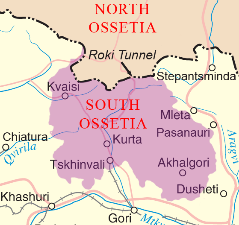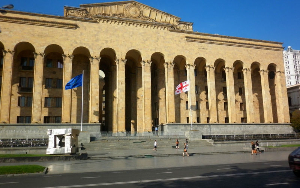Russia Takes Steps to Absorb South Ossetia
By Valeriy Dzutsev (08/14/2014 issue of the CACI Analyst)
Against the backdrop of the events in Ukraine, Moscow appears to take steps toward quietly incorporating the Georgian breakaway region of South Ossetia into Russia. The republican authorities announced that plans were under way for South Ossetia and Russia to establish a unified customs checkpoint at the border between the two countries. Russia is on a collision course with Georgia over the South Caucasian country’s recent signing of an Association Agreement with the EU. As South Ossetia is again becoming an important tool for Moscow’s policies in the South Caucasus, the Russian government appears intent on establishing even greater control over its satellite state in the region and using it against Georgia.

The Georgian Orthodox Church and its Involvement in National Politics
By Carolin Funke (08/14/2014 issue of the CACI Analyst)
After the dissolution of the Soviet Union, the Georgian Orthodox Church (GOC) emerged as Georgia’s most respected and influential institution. It has played a significant role in the Georgian public sphere ever since and enjoys a high level of trust among the Georgian population. But as Georgia moves towards Euro-Atlantic integration, the GOC increasingly appears to develop into a political force. Recent statements by the clergy on Georgia’s municipal elections and the GOC’s active involvement against law-making and political processes intended to strengthen social and political pluralism raise concerns over its role in Georgia’s democratic development.

Georgian Authorities Arrest Former Mayor Gigi Ugulava
By Eka Janashia (08/05/2014 issue of the CACI Analyst)
The Investigation Service of Georgia’s Ministry of Finance detained Gigi Ugulava, a former mayor of Tbilisi and election campaign chief of the opposition party United National Movement (UNM), at Tbilisi’s airport before boarding a flight to Kiev, on July 3. Ugulava’s arrest sparked apprehension ahead of the decisive second round of the local elections held on July 12.
On July 2, the Tbilisi City Court turned down the prosecution’s motion to prevent Ugulava from traveling to Ukraine by depriving him of his passport and ID card. Since Ugulava has traveled abroad several times and returned back to Georgia for the last two years, the court found it inadvisable to ban his trip. However, the Investigation Service justified the arrest with the “urgent need” to interrogate Ugulava.
Two days earlier, the Investigation Service revealed new criminal charges against Ugulava related to the misspending of public funds and abuse of authority during his term as mayor. In 2009 and 2011, Ugulava allegedly granted preferential treatment to the car parking company CT Park in the distribution of revenues garnered through fines that incurred misspending of around US$ 614,000 in budgetary funds.
After the arrest, Ugulava was incriminated with additional accusations of money laundering and hooliganism taking place at the Marneuli District Election Commission in early June.
Ugulava has purportedly received “black” money amounting to US$ 760,000 from an offshore registered company affiliated with the former Defense Minister Davit Kezerashvili to fund UNM’s election campaign. In relation to the Marneuli incident, Ugulava was charged under articles 150 and 226 of the criminal code dealing with “coercion” and “organizing actions by a group which violate public order.”
Aside from the most recent indictments, Ugulava has already faced multiple criminal charges since February 2013. The allegations involve misspending and embezzlement of large amounts of public funds (around US$ 28.2 million) in 2011-2012. Although the court suspended Ugulava from the Tbilisi mayor’s office in 2013, it declined the prosecution’s motion for Ugulava’s pre-trial detention and freed him on bail. It was only on July 4, 2014 that the Tbilisi City Court eventually ruled in favor of the prosecution’s request and ordered pre-trial custody for Ugulava.
The court’s decision boosted the protests of UNM supporters rallying outside the court building. The dissent rapidly turned into a clash between police and activists. Several people were detained, including UNM lawmaker Levan Bezhashvili and former ambassador to Italy Kote Gabashvili for the administrative offense of petty hooliganism and disobeying police orders.
Ugulava’s defense lawyer appealed the decision at the Court of Appeals but the judge Giorgi Mirotadze considered the petition as irrelevant. UNM insisted that by this decision, Mirotadze, who became a judge in November 2013, approved to become one of the government’s favorite judges emerging within the judiciary since Georgian Dream came into power. Former PM David Bakradze said the UNM intends to submit Ugulava’s case to the Strasbourg-based European Court of Human Rights.
The U.S. ambassador to Georgia, Richard Norland, as well as the EU’s foreign policy chief Catherine Ashton said they are deeply concerned with Ugulava’s arrest and will follow the case closely. Their concerns were particularly raised due to the cancelation of a moratorium declared by PM Irakli Garibashvili on April 14, when Garibashvili called on the law enforcement agencies to refrain from detentions or other sorts of legal restrictions against political figures involved in the election campaign.
The head of the EU Delegation to Georgia, Ambassador Philip Dimitrov, warned that signing the Association Agreement does not mean that “everything else, including the liberalization of the visa regime, should be considered to be guaranteed.” More overtly, the Vice President of the European People’s Party (EPP), Jacek Saryusz-Wolski appraised Ugulava’s arrest as “unfortunate development” and blamed Georgian authorities for “political retribution” conducted against Georgia’s main opposition and EPP member-party.
Conversely, PM Garibashvili assessed the court’s decision as a “celebration of justice” and welcomed the reinforced independence of the judiciary. In response, Ugulava wrote on his Facebook account that “prison and exile do not stop political processes.” At the court hearing he denied all charges against him as politically motivated and expressed his determination to continue the fight against the oligarch Bidzina Ivanishvi’s regime.
Ugulava’s detention prior to the second round of the local polls not only discredited the moratorium policy, but also triggered expectations about a new wave of politically inspired prosecutions labeled a “restoration of justice.” Maintaining this sort of policy might seriously damage Georgia’s EU-integration course.
Georgia Takes a Step Closer to the EU
By Eka Janashia (07/02/2014 issue of the CACI Analyst)
On June 27, Georgia’s Prime Minister Irakli Garibashvili, the European Council’s President Herman van Rompuy, and the European Commission’s President José Manuel Barroso signed the Association Agreement (AA) including a Deep and Comprehensive Free Trade Agreement (DCFTA), which was initialed at the EU’s Eastern Partnership summit in Vilnius in November 2013. At the same ceremony, the EU inked the AA with Ukraine and Moldova. The AA sets priorities for the period of 2014-2016 to achieve closer political association and economic integration between Tbilisi and the EU.
“It is very difficult to express in words the feelings I am experiencing now. June 27 will be remembered as a historic and special day. Today a new big date is being written in the history of my homeland, which gives hope and which our future generations will be proud of,” PM Garibashvili said at the signing ceremony. In his speech, Garibashvili also addressed Abkhazians and South Ossetians, pledging that a step towards the EU will bring benefits for them too.
The signature of the AA was initially planned for the end of this year but developments in Ukraine induced Brussels to accelerate the process. The AA has replaced the EU-Georgia European Neighborhood Policy Action Plan of 2006 and involves both political and economic components. It envisages reforms aimed at enhancing the quality of democracy by strengthening the rule of law, independence of the judiciary, respect for human rights, as well as peaceful conflict resolution, and cooperation on justice, freedom, and security. The economic component includes the DCFTA and stipulations on cooperation in the energy, transport, employment and social policy sectors.
To this end, Georgia should establish an adequate institutional framework comprising an Association Council, committees, subcommittees and trade-related working groups as well as monitoring mechanisms which will ensure Georgia’s gradual approximation to EU standards and regulations in trade, customs procedures and quality controls. Although the process of approximation does not imply eventual integration with the EU, it paves the way for potential membership at some point in the future.
Georgia is supposed to ratify the agreement in the second half of July. Whereas the process of ratification by the parliaments of EU member states might take several years, the treaty foresees provisional application that could start tentatively in October 2014.
The EU will support the process of implementing the AA through providing financial, technical, information sharing and capacity building support. In July, Brussels envisages the adoption of new assistance programs worth 101 million Euros to advance Georgia’s justice sector and the potential of small and medium business.
After signing the AA, PM Garibashvili welcomed Russia’s “constructive” approach. In his words, Moscow pledged not to obstruct the process and it kept the promise. However, on June 25, Russia’s Foreign Minister Sergei Lavrov said that if the DCFTA between the EU, Georgia, Ukraine and Moldova harms the free trade regime of the Commonwealth of Independent States’ (CIS), Moscow will apply “protective measures in complete accordance with the WTO rules.” In response, European Commission President José Manuel Barroso stated that “these Agreements are for something, not against anyone” and that the EU does not seek exclusive relationship with these partners.
The Trade Sustainability Impact Assessment 2012 report, commissioned by the EU, examined the DCFTA’s potential impact on Georgia’s economy. It suggests that the DCFTA might increase Georgia’s GDP by 4.3 percent in the long-term. Tentatively, full implementation of the trade-related reforms will increase Georgia’s exports to the EU by 12 percent and its imports by 7.5 percent, which will improve the country’s long-lasting trade deficit.
While these estimations are based on a long-term perspective, it is unclear what the immediate consequences would be of the “protective measures” that Moscow may impose on Georgia due to the alleged negative implications of DCFTAs between the EU, Georgia, Ukraine and Moldova for the CIS free trade zone. Georgian and Russian experts have even arranged technical consultations to examine the potential effects of the DCFTA on trade between Russia and Georgia.
According to Georgia’s state statistics office, Georgia’s export to CIS member countries in January-May 2014 reached US$ 627.6 million, compared to US$ 253 million to the EU. Moreover, Azerbaijan, Armenia and Russia constituted Georgia’s largest export markets at US$ 240.4 million, 129.7 million, and 108.3 million, respectively.
However, the DCFTA does not restrict the existence of FTAs between Georgia and other countries. Georgia has bilateral free trade agreements (FTA) with major trading partners including Russia and Turkey, and penetration into the EU market will not necessarily take place at the detriment of those of post-Soviet countries.
Although the AA has both political and economic components, the latter has attracted more attention from the public and observers. Most Georgians seemingly assess the agreement in light of the opportunities the AA may provide in terms of improving welfare and the country’s overall economic performance rather than as an instrument for enhancing the quality of democracy.
Political Change in Abkhazia and South Ossetia Ahead of Georgia-EU Agreement
By Valeriy Dzutsev (06/18/2014 issue of the CACI Analyst)
Profound and simultaneous changes in Georgia’s breakaway regions of Abkhazia and South Ossetia signify Moscow’s increasing involvement in the affairs of its satellites. The changing political landscape in these territories appears to reflect Russia’s desire to establish greater control over them and make them more useful for its purposes. Russia’s control over Abkhazia and South Ossetia still fills the primary purpose of exerting pressure on Georgia. Georgia may again encounter hurdles in the run-up to signing its Association Agreement with the EU, although Russia too faces constraints as it is tied up in the battle for Ukraine.






